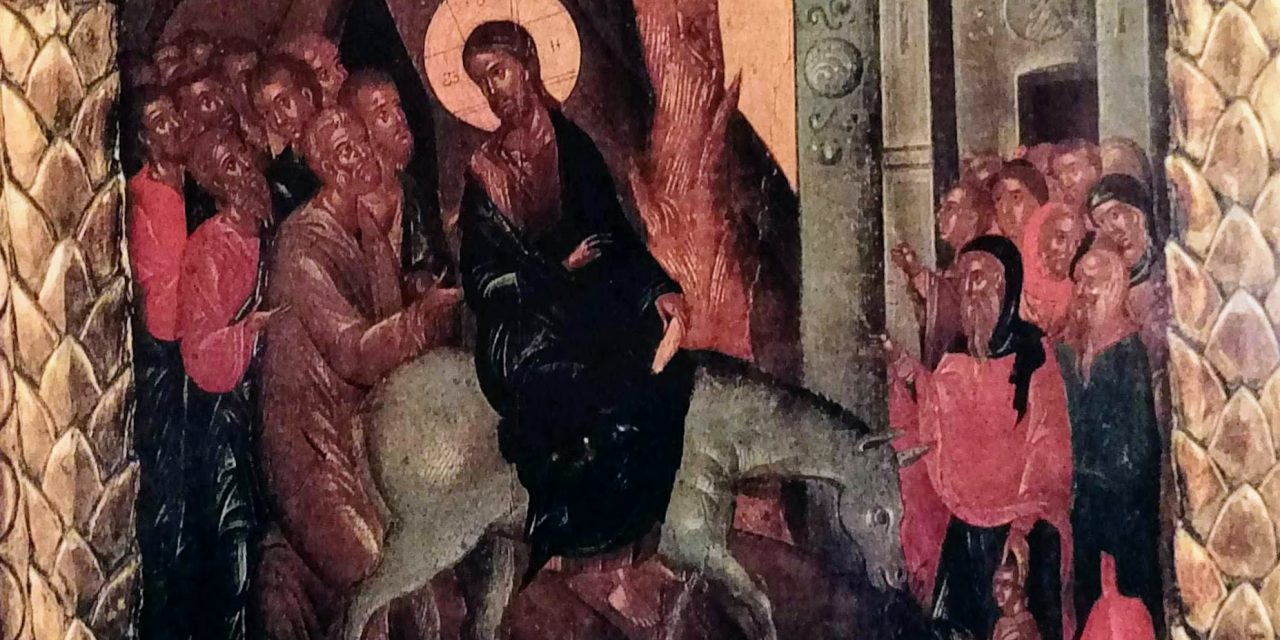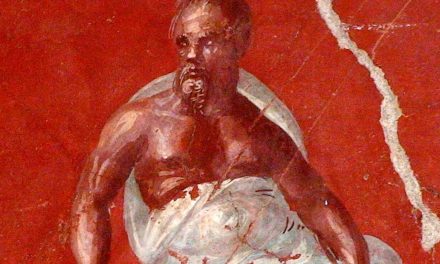At Palm Sunday, we pause at the gate of the paschal mystery and look down the path ahead of us, seeing at the same time Jesus’ welcome as the son of David and his rejection as criminal. That is to say, we see humanity, ourselves, both crying out in joy at his arrival and turning against him. We witness both the desire of humanity for change and our rage against change. How we long for healing! How we fear the touch of the physician!
A cast of thousands swirls through these stories, first singing and cheering, questioning, feasting, dozing off, sneaking away, plotting and raging, beating and killing. It would be a mistake, however, to focus on ourselves, mirrored in the storm of humanity raging through the passion narrative. Self-examination has its place, but if our shame at humanity’s failures in this story turns our eyes away from Jesus, then it is better that we be shameless. Palm Sunday is about the coming of Jesus, our hearts’ desire, our redeemer, our healer. So we must face the human weakness, the betrayal, the brutality. Yes, that is us. And knowing who we are, let us still cry out, “Blessed is he who comes in the name of the Lord!”
Jesus is the eye of this storm. He says little in these long readings and almost nothing after his arrest. What he does say is conspicuous for its simplicity and directness. This is the quality that Pope Francis calls parrhesía in his Apostolic Exhortation on holiness, Gaudete et Exsultate, #129-139. This Greek word parrhesía is the one behind English phrases in the gospels such as, “he did nothing in secret” or “he spoke openly.” Francis translates it as “boldness,” a fearless compassion that reaches out to others without hesitation, without defensiveness. Jesus’ yes is yes and his no is no, even when he is confronted by enemies who threaten his life, because he wants to know and be known, to love and be loved.
Blessed is he who comes in the name of the Lord! He comes, not clinging to defenses, not trying to prove himself, not trying to secure dominance. He comes as the king who empties himself to be with his people. He comes into the city, into the crowd, into the festival, into the thick of our world. He comes, knowing who we are better than we know ourselves. In these readings, he stands steadily at the center, gazing at each of us, in love. He doesn’t look away. He sees who we are.
He has come into the world to be with us. And he is not leaving us.
That’s the sense in which this arrival is, for all the menacing irony we may read into the hosannas of the fickle crowd, a victorious entry. He enters into the very depths of humanity like one taking a throne. Setting aside his comfort, safety, and eventually his life, emptying himself, he has chosen to be the king who stays with his people, no matter what they do. This is God’s glory already revealed.
How right it is then that we cheer to welcome him as he enters into this path. This is his glory and our salvation. So we begin this week not in penitence but in praise of this faithful king, who loves us beyond anything we could call reason.
We celebrate the paschal mystery this year particularly attentive to mortality and our need for salvation because of the COVID-19 pandemic. Many of us are walking a frightening path: sickness, poverty, stress, grief, and isolation threaten us. We are forced to notice our fragility, the fragility of our bodies and our social systems, more than usual.
We can also see humanity at its best and worst, more than usual. Callous disregard for life and hoarding without regard for the need of others are on display, on the one hand. On the other are the many offering their bodies to protect the lives of neighbors, whether they deserve it or not. We see a reflected ray of God’s grace in their work.
But today is about Jesus’ faithfulness to us, not about our regrets or grief or anger. In these readings, we can look at humanity in its confusion and fear and its longing for God and recognize: yes, that is us. That is our world. And we can see at the center of that storm, the still and open person of Jesus, gazing at it all with a love that will not be shaken. His triumph is his faithful love. We are invited to walk that path with him.
Blessed is he who comes in the name of the Lord!




